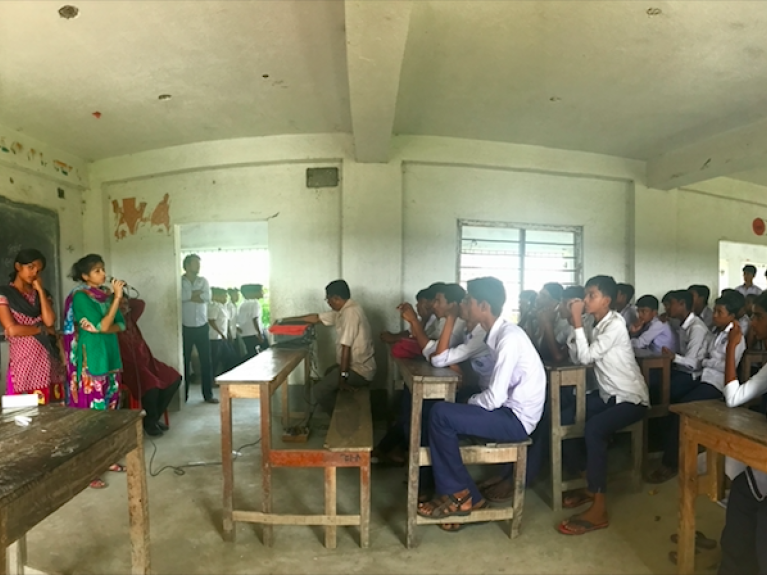MISSING Rural Awareness Campaign, India
MISSING is a public awareness campaign which aims to sensitize the populace to the desperate plight of millions of little girls who are trafficked for sexual exploitation.

Project name: MISSING Rural Awareness Campaign
Project location: West Bengal, India
URL Website: http://www.savemissinggirls.com
URL Facebook: https://www.facebook.com/missingpublicart/
URL Twitter: https://twitter.com/MISSINGIRLS
URL Instagram: https://www.instagram.com/missingirls/
Project video: https://www.youtube.com/watch?v=8qp58ExZ4Cs

Project description:
MISSING is a public awareness campaign which aims to sensitize the populace to the desperate plight of millions of little girls who are trafficked for sexual exploitation. Today, there are 3 million prostituted women in India, out of which 1.2 million are young girls. We strongly feel that the time to communicate how sex trafficking affects our society is now.
In accordance with the UN’s 4 P’s against trafficking, prevention comes first. MISSING Public Awareness Campaign has moved into that sphere of action against trafficking engaging the public through its iconic silhouette, which is a visual metaphor of disappearance.
The MISSING Rural Awareness Campaign aims at spreading awareness to vulnerable youth in areas which are highly prone to sex trafficking through classroom awareness sessions conducted by our youth volunteers. Our session includes audio visuals, and the iconic MISSING silhouette stencil, which is an interactive and impactful way to engage students. We particularly target government run public high schools as adolescents are the most vulnerable to this issue. A typical session, includes our team getting familiar with the class, after which, they delve into more serious matters by narrating a story of a girl, just like them who was a victim of sex trafficking.
This is followed by a questionnaire that serves 2 purposes. Firstly, the questionnaire allows us to get an idea of how much and what the children learned about trafficking from our session enabling us to alter and edit our sessions to make maximum impact. Secondly, the cognitive questionnaire works to collect data which strengthens our database that will eventually be part of a larger behavioral pattern study, which we hope will aid in advocacy against trafficking.
We at MISSING believe strongly that in order for long lasting change, initiatives need to be sustainable. Rather than sending out our ground team to schools to conduct the sessions alone, we work with local women and youth. We conduct training sessions and mentor them, empowering them to be changemakers in their own communities. In this way our program also provides a livelihood for young women and girls.
Goal and purpose of the project:
The MISSING Rural Awareness Campaign aims to spread awareness amongst vulnerable youth in one of the highest trafficking areas in India to prevent them from becoming victims of sex trafficking.
1) So far MISSING has worked in 50 schools, across 3 districts, and reached out to thousands of young students. Our goal is to reach out to 300 further schools, spreading awareness to approx. 25,000 students.
2) Through our awareness session we would educate children on what trafficking is, who traffickers could be, the myriad ways in which trafficking takes place. Further we would provide them information on resources available to them and.For Fo educate them on their rights. This is done in an impactful and innovative way through storytelling, and stencil making such that it makes maximum impact.
Your help could be instrumental in reaching out to a vulnerable girl in rural India, who is not aware of the threat of trafficking that surrounds her. Armed with the information we provide her, she will be better equipped to protect herself.
Motivation of the applicant / applicant team:
Sex trafficking is still widely prevalent in the world we live in, our goal is to spread awareness about this heinous issue in one of the most vulnerable districts in all of India.
1) The problem is on the rise: As per data collected by the Ministry of Women and Child Development in India there has been an almost 25% rise in the no. of women and children who were trafficked in India from the previous year.
2) West Bengal is disproportionately affected by trafficking: It is estimated that West Bengal accounts for about 42% of all trafficking cases given its geographic location near the borders of Nepal and Bangladesh. Within Bengal, South 24 Parganas features among the top five districts in terms of trafficking
3) Trafficking is a persistent and prevalent problem: We have been able to take some initial steps in the 2 most vulnerable districts of West Bengal and have seen very positive results with our engagement.
Teachers have come forward to express their gratitude towards us for conducting this anti-trafficking awareness sessions as we have learned that on an average, 3-4 girls disappear from classes 7 and 8 every year.
While conducting awareness sessions in the past, we have seen from the children’s faces that most of the them have faced the issue of sex trafficking directly. To have such a deep experience with the horrific issue at a mere age of fourteen or fifteen, is something that should drive us to protect these children and preserve the sanctity of their childhood.
Use of prize money:
The money we receive through this grant will be constructively used for our Awareness Campaign in Rural Bengal. The cost of reaching out to one school is very minimal and is only approx. €50. For this amount we can reach anywhere from 100-250 students per school. This amount goes towards:
1) Training for youth leader's skill set development
2) Remuneration for youth leaders as a livelihood option
3) Travel cost for access to remote geographical spaces only
4) Communication materials (such as informational charts, handouts for students, questionnaires)
5) Stencil Making
Your help could be instrumental in reaching out to thousands of vulnerable girls in rural India, who are not aware of the threat of trafficking that surrounds them. Armed with the information we provide them, they will be better equipped to protect themselves.